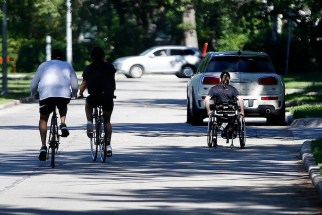Death, obligation on ‘unknown frontier’ of Manitoba ICUs Nurses talk of relentless pressure under COVID-19 third wave
Read this article for free:
or
Already have an account? Log in here »
To continue reading, please subscribe:
Monthly Digital Subscription
$0 for the first 4 weeks*
- Enjoy unlimited reading on winnipegfreepress.com
- Read the E-Edition, our digital replica newspaper
- Access News Break, our award-winning app
- Play interactive puzzles
*No charge for 4 weeks then price increases to the regular rate of $19.00 plus GST every four weeks. Offer available to new and qualified returning subscribers only. Cancel any time.
Monthly Digital Subscription
$4.75/week*
- Enjoy unlimited reading on winnipegfreepress.com
- Read the E-Edition, our digital replica newspaper
- Access News Break, our award-winning app
- Play interactive puzzles
*Billed as $19 plus GST every four weeks. Cancel any time.
To continue reading, please subscribe:
Add Free Press access to your Brandon Sun subscription for only an additional
$1 for the first 4 weeks*
*Your next subscription payment will increase by $1.00 and you will be charged $16.99 plus GST for four weeks. After four weeks, your payment will increase to $23.99 plus GST every four weeks.
Read unlimited articles for free today:
or
Already have an account? Log in here »
Hey there, time traveller!
This article was published 21/06/2021 (1630 days ago), so information in it may no longer be current.
As Manitoba approached peak ICU admissions, critical care nurses working in the third wave of the COVID-19 pandemic were seeing more patients who were younger, sicker, and more afraid.
“I think, at first, we didn’t appreciate how scared patients are, coming in. And in the beginning, I don’t think people were scared because they didn’t know how bad this was going to get. But the younger kids coming in that we get, they’re just so frightened and you can’t comfort them because you’re just a stranger and you’re doing scary things to them,” said one critical care nurse at St. Boniface Hospital.
“I had an elderly gentleman that we had to intubate right away, and the last thing he said to me is, ‘Please let me call my wife,’ and I said no, because he needed that tube in fast. And he died,” she said.
“That’s what I get from that, is that I did not let that man speak to his wife. It’s horrible. It takes a long time to set those things aside and be effective for the next poor scared person that comes in.” – Critical care nurse
“That’s what I get from that, is that I did not let that man speak to his wife. It’s horrible. It takes a long time to set those things aside and be effective for the next poor scared person that comes in.”
Five Winnipeg nurses who’ve been treating COVID-19 patients in intensive care and emergency departments shared with the Free Press their experiences leading up to and during the height of third-wave hospitalizations.
On condition of anonymity, they spoke about patients waiting in emergency rooms and on wards much longer than they should because there’s no ICU space for them in a system stretched thin long before the pandemic started.
They talked of working consecutive 16-hour shifts, agreeing to extra overtime, and coming in on their days off because they know co-workers are already short-handed.
Of seeing more death and fewer success stories; of crying in their personal protective equipment after updating patients’ families; of not being informed of operational plans until the last minute.
They spoke about feeling numb and never having time to decompress, and carrying the additional weight of uncertainty during ongoing contract negotiations between employer and union. About the strange camaraderie of a strike vote, and their hopes and fears for the future of the profession in Manitoba.
In an unprecedented move, brought on by the highest COVID-19 infection rate in North America and a severe lack of hospital staff to handle the surge, Manitoba began sending ICU patients out of province during the Victoria Day long weekend. Since then, 57 Manitobans have been treated for COVID-19 in hospitals in Ontario, Saskatchewan, and Alberta.
“I don’t know where we would have absorbed those patients in the system… even now we’re running out of equipment, we’re running out of supplies,” a Health Sciences Centre ICU nurse said in an interview earlier this month.
“We cannot provide safe care for them here, so sending them away was the lesser of two evils, and that’s a hard pitch to sell, but we just couldn’t do it,” she said. “People are tired, they’re getting cynical. There’s no time to treat your own mental health, every day is just go, go, go.”
On top of the surge in COVID patients, the third wave revealed some so-called “invisible” patients — people who had been putting off non-COVID medical visits during the pandemic were increasingly showing up in ERs.
“We cannot provide safe care for them here, so sending them away was the lesser of two evils, and that’s a hard pitch to sell, but we just couldn’t do it. People are tired, they’re getting cynical. There’s no time to treat your own mental health, every day is just go, go, go.” – Critical care nurse
One St. B ER nurse who took a break from the department because of the immense pressure of working during the pandemic said she’s seen an increase in people coming to hospital because of mental health concerns, alcohol and drug use, as well as other conditions that had worsened.
She described an ER shift spent looking after three critically ill patients, each sick enough to require one-on-one care in an ICU.
“You literally never know what’s going to come in, but we like that and that’s why we want to work there. And it’s different now. It’s dysfunctional now. The expectations of an emergency room nurse are completely unsafe, in terms of what they can provide for their patient care,” she said.
“My constant adrenaline level, I could feel it every day as soon as I’d walk in that department, and it got me to the point where I wasn’t really healthy and so I had to leave and take a break.”
Several of the nurses interviewed said they had colleagues who’ve recently quit or been reassigned because the toll of working in critical care became too much. Even those who want to stay are already worried about the residual effects of the pandemic — on patients, the health system, and their own well-being.
“I often think about, it would be nice to work in a place where life is happening, because it feels like death is always happening,” said one HSC ICU nurse.
“I think I will have to move on to something that is more positive, eventually.”
All of the nurses emphasized the personal and professional responsibility they feel for their patients and team. However, they also expressed feeling as though personal commitment to provide the best possible care has been exploited by health-care leadership not adequately involving them in pandemic planning.
They’re doing the best they can, the nurses said, but it didn’t have to get this bad.
“I have a moral obligation; I have an interest in people getting better and being healthy,” one St. Boniface ICU nurse said, adding she understands it’s “an unknown frontier” in this pandemic.
“It’s dysfunctional now. The expectations of an emergency room nurse are completely unsafe, in terms of what they can provide for their patient care.” – Critical care nurse
“But it can also be done with respect and understanding.”
Manitoba nurses have been without a contract for four years; bargaining is ongoing. On June 10, 11,954 Manitoba nurses voted 98 per cent in favour of a strike.
The Manitoba Nurses Union is considering rotating stop-work action that would have nurses maintain essential duties but stop non-essential work (such as answering phones).
The union is expected to make a decision by July, on whether to call a strike.
katie.may@freepress.mb.ca
Twitter: @thatkatiemay

Katie May is a general-assignment reporter for the Free Press.
Our newsroom depends on a growing audience of readers to power our journalism. If you are not a paid reader, please consider becoming a subscriber.
Our newsroom depends on its audience of readers to power our journalism. Thank you for your support.







